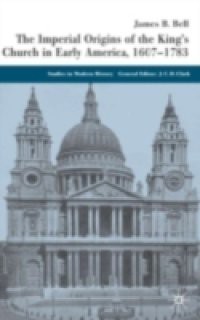The origin of the movement to extend the King's church to the American colonies is anchored in the writings of Richard Hakluyt. In company with Walter Raleigh he prompted a new foreign policy for the consideration of Queen Elizabeth I, a policy that championed the creation of a Protestant empire as a foil for the expansionist activities of Catholic Spain and Portugal in the Western Hemisphere. Hakluyt believed that a colonial church would serve as an instrument for maintaining and binding overseas settlers and settlements with English ways and government.The experience of the imperial King's church in Early America falls into four chronological periods, each with distinctive characteristics. The first period runs from the founding of James Town in Virginia until about 1675. The second era, from 1675 to about 1715 was its most vigorous and ambitious stage of development. Between 1715 and 1750 the third period witnessed consolidation and steady growth in the number of congregations and the increase of native-colonists who became ministers. Finally, the fourth era extended from about 1750 until the Revolutionary War and was marked by the unfolding political events and the movement towards the Declaration of Independence.

